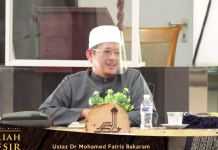بسم الله الرحمن الرحيم
Bismi-llāhi r-raḥmāni r-raḥīm
In the name of Allah, Most Gracious, Most Merciful
اللهم صلي على سيدنا محمد وعلى اله وصحبه وسلم
Allahumma salli ala Sayyidina Muhammad wa ala alihi wa sahbihi wasallim
O Allah, send your peace and blessings upon our Master Muhammad and upon his family and companions
This article is a summary of takeaways from Ustaz Dr Mohamed Fatris Bakaram’s Tafsir Online Lecture on 18th October 2020. Summaries of previous lectures on Surah Maryam, Surah Taha, Surah Al-Anbiya’ and Surah Al-Hajj can be found here. The previous lecture of Surah Al-Mu’minun can be found here.
Recap of Previous Verses
In the previous lecture, we went through verses 31 to 41 of Surah Al-Mu’minun. We spoke about how Prophet Hud AS had been denied by his people who hurled accusations of him and refused to accept his message. They claimed that a mere human being like them could not have been sent as a messenger by Allah SWT.
This was similar to the story of Prophet Nuh AS which we went through previously. We learnt about the du’a that Prophet Nuh AS made: “رَبِّ انصُرْنِي بِمَا كَذَّبُونِ” meaning “My Lord, grant me victory because they have denied me.”.
This was the same du’a made by Prophet Hud AS, resulting in the disbelieving people being destroyed by Allah SWT with a loud scream that seized them and made them like debris floating in the sea. These people were distanced from the Mercy of Allah SWT because of their wrongdoings.
Who were these People? How were they destroyed?
Some listeners have brought up that they were a bit confused after the last lecture. From their prior knowledge of Prophet Hud AS, his people, the People of ‘Ad, were destroyed by an intense earthquake – not from a loud scream.
Instead, the people who were known to have been wiped out by a loud scream were the people of Thamud, the people of Prophet Salih AS. Tafsir scholars mention that the word ‘Soyhah’, translates into ‘the loud scream’.
As the name of prophet and his people were not mentioned in verses 31 to 41, scholars have differing opinions when determining which prophet and people these verses were referring to.
Most scholars – including Imam Qurtubi, Imam Ibn Kathir, Imam Fakhrudin Ar-Razi and Imam Tabari – hold the opinion that these verses refer to Prophet Hud AS and the people of ‘Ad.
This is because in the Qur’an, whenever the story of Prophet Nuh AS is mentioned and it is followed by the story of another prophet and his people, it is always Prophet Hud AS’ story that follows. So, these scholars say that this story is no exception; it refers to Prophet Hud AS and the ‘Ad.
However, the question is posed about how the people of ‘Ad were destroyed. From other stories in the Qur’an, we have learnt that the people of ‘Ad were destroyed by an earthquake – not a loud scream.
Scholars say that the loud Scream referred to here is the scream of an angel to announce the start of the punishment of Allah upon the people; the scream initiated the earthquake that wiped out the people of ‘Ad.
The second opinion holds that since the mode of destruction referred to in these verses as a loud Scream, and this was the mode of destruction linked to the people of Thamud, then these verses refer to the people of Prophet Salih AS.
This opinion is not strongly supported because at the start of these section of verses, it was mentioned that these people came after Prophet Nuh AS. Prophet Hud AS came immediately after Prophet Nuh AS, not Prophet Salih.
At the end of the day, Allah SWT had his reasons for not revealing the name of the people mentioned. This book was revealed by Allah SWT. It is up to His Wisdom to choose what is being revealed.
Scholars have done their Ijtihad, their own independent reasoning, to determine what they think is the likely identity of these people, based on the evidence they found in other places in the Qur’an.
Even so, the truth is only known by Allah SWT. What is important is that we see that whether it the ‘Ad or the Thamud, both groups were given the same message by their respective prophets, both groups were stubborn and chose to reject the message, and both groups were destroyed by a calamity sent by Allah SWT.
Iram and the Civilisations that Followed
ثُمَّ أَنشَأْنَا مِنۢ بَعْدِهِمْ قُرُونًا ءَاخَرِينَ
Then We raised after them other generations. [23:42]
Continuing to the next verse, the word ‘ansh’a’ was used here instead of the words ‘khalaqa’ or ‘ja’ala’ although both words also mean ‘created’. The word ‘ansha’a’, often translated to mean ‘created’, carries with it an additional meaning.
This word is used for when something is built, raised, or constructed. The usage of this word shows us that Allah SWT created a generation that was gifted with many advantages like wealth, prosperity, even the strength to build great civilisations.
They were known in the Qur’an as people who had the skills and technology to build massive buildings with lofty pillars that were unprecedented. In Surah Al-Fajr, we hear about Iram:
أَلَمْ تَرَ كَيْفَ فَعَلَ رَبُّكَ بِعَادٍ
Did you not see how your Lord dealt with ‘Ad,
إِرَمَ ذَاتِ ٱلْعِمَادِ
of Iram, [the city] of lofty firm pillars,
ٱلَّتِى لَمْ يُخْلَقْ مِثْلُهَا فِى ٱلْبِلَـٰدِ
The likes of whom had never been created in the land?
[Surah Al-Fajr, 89:6-8]
Until today, scholars still have not determined the location of Iram, home of the ‘Ad. The pillars of the buildings of Iram were known to be so firm and so strong that it may be that when they constructed these buildings, they would have declared, “Nothing can ever destroy our city!”.
This city was however, wiped away completely, by the earthquake that followed the loud scream, such that there was no trace left behind of it. Allah destroys whatever He Wills. Scholars differ in their opinions as to where to locate it.
Some say that it is in the region of Yemen, others say it is near Syria. These opinions cannot be validated. Sometimes, when Allah SWT destroys a people, He leaves ruins behind so that we may reflect upon and learn from what had happened to them.
The people of Prophet Salih AS, the Thamud, can be traced to an area in the Arab lands where the remains of buildings are maintained until today. This place is known today as ‘Mada’in Salih’. Allah’s Power to preserve is not limited to buildings and structures.
There is a person who was so engrossed in disbelief and arrogance against Allah SWT that his body was preserved; this was not as a sign of honour or respect, rather, it serves as a warning for us all. This person was Firaun. The bodies of the pharaohs have been preserved by Allah SWT even today, centuries later.
Going back to verse 42 of Surah Al-Mu’minun, after Allah SWT destroyed the people of Hud, He SWT replaced them with generations of people that flourished. After the people of ‘Ad were destroyed, the people of Thamud emerged.
They too were powerful and strong, they carved out buildings out of stone mountains that last for thousands of years. Allah SWT used the word ‘ansha’naa’ to demonstrate that these people were “built” after the destruction of the previous people.
A Reminder that Blessings Can be A Trial
Allah SWT is giving us a sign, reminding us that as human beings living on Earth, there is a lot that Allah SWT can give us. If Allah SWT gives us prosperity, strength, power, and glory, sometimes we as human beings, we forget.
These advantages given to us become the reason for our arrogance and pride. As a result, we are stopped from being able to accept the message of Allah SWT when it comes to us. This was what we saw from the stories of Prophet Nuh and Prophet Hud AS.
The arrogance of the people caused them to look down upon the prophets. They asked their prophet AS, “Who do you think you are? You are no better than us! You are not wealthy, influential, and noble unlike us. Why would God choose you as a messenger?”.
These verses were sent down as a warning to us, to ensure that we do not repeat the same mistakes of the people of the past. We do not want to be like the people who benefit from all sorts of blessings from Allah SWT, only to have their hearts being deprived of gratitude, being filled with arrogance, and being firm in disobedience.
The good that had been showered upon them only resulted in them being distanced from Allah SWT. The blessings and gifts from Allah SWT are not given freely to anyone, they come at a cost. We will be held accountable for each of these gifts upon our return to Allah SWT.
May Allah SWT protect our hearts regardless of the goodness and advantages that He has given us, whether at the level of an individual or as a community.
May we become a community that treasures the gifts that Allah SWT has bestowed upon us, that takes care of the trust that Allah SWT has bestowed upon us, that produces good out of the goodness given to us out of obedience and gratitude towards Allah SWT.
May we be distanced from being amongst those who use the goodness they receive to turn towards arrogance, pride, and disobedience to Allah SWT. Ameen.
To Each Community, an Appointed Time
مَا تَسْبِقُ مِنْ أُمَّةٍ أَجَلَهَا وَمَا يَسْتَـْٔخِرُونَ
No community can advance its time, nor can they delay it. [23:43]
The time of a community has already been set by Allah SWT. What this means is that if a certain population has been decided by Allah SWT to emerge and flourish at such and such a time, then they will only appear at that appointed time, not even a bit earlier or later. Likewise, if Allah has destined for a civilisation to be destroyed, they will disappear at an appointed time, nothing can advance or delay it.
This applies as well to our communities. Allah does as He wills SWT. If He has determined that the community will live in harmony for a long time, then it will continue to live harmoniously for a long time.
When the time comes for Allah SWT to remove the peace and prosperity for whatever the reason – be it our disobedience, our pride, or our immorality – then Allah can remove it just like that. Allah is the Almighty.
History Repeats Itself, So Take Heed
ثُمَّ أَرْسَلْنَا رُسُلَنَا تَتْرَا ۖ كُلَّ مَا جَآءَ أُمَّةًۭ رَّسُولُهَا كَذَّبُوهُ ۚ فَأَتْبَعْنَا بَعْضَهُم بَعْضًۭا وَجَعَلْنَـٰهُمْ أَحَادِيثَ ۚ فَبُعْدًۭا لِّقَوْمٍۢ لَّا يُؤْمِنُونَ
Then We sent Our messengers in succession. Every time there came to a nation its messenger, they denied him, so We made them follow one another [to destruction], and We made them ahadith. So far away are a people who do not believe. [23:44]
The messengers were sent, one after another, some consecutively, others with a period of gap in between them. Prophet Ibrahim and Prophet Lut, Prophet Musa and Prophet Harun, and Prophet Daud and Prophet Sulaiman, these pairs of prophets were sent together during the same respective period of time.
There were also Prophets who were sent with a gap of time between them, for example Prophet Isa AS and Prophet Muhammad SAW. History repeats itself with the advent of each of the prophets – from the time of Prophet Nuh AS, to Prophet Hud AS, to Prophet Salih AS.
Prophet Musa AS faced much difficulty with Bani Israel, as we have learnt in Surah Al-Baqarah. Prophet Isa AS was denied so much so that his people tried to kill him. There was never a prophet that was not rejected by his people – not even Rasulullah SAW.
Therefore, Allah SWT caused the deniers to suffer from His Wrath SWT, one people after another. And He made them ‘ahadith’, meaning stories that are oft repeated and spoken of. They become conversation material.
Most of what is conversation fodder is often forgotten. However, as the Ummah of Muhammad SAW, we do not forget these stories because they are written in the Qur’an; this book has been guaranteed by Allah SWT to be preserved and protected until the last day.
As believers, we need to take heed from this. Read the Qur’an and remember. Learn from the lessons in the Qur’an; remember what is good and practice it and remember what is bad and ensure that we do not repeat the same errors. Allah says that the disbelievers are ‘distant’. What this means is that they are distanced from the Mercy and blessings of Allah SWT.
Prophet Musa and Harun AS and their People
ثُمَّ أَرْسَلْنَا مُوسَىٰ وَأَخَاهُ هَـٰرُونَ بِـَٔايَـٰتِنَا وَسُلْطَـٰنٍۢ مُّبِينٍ
Then We sent Musa and his brother Harun with Our signs and a clear authority [23:45]
What is meant by “Sultanin mubiin” or ‘evident authority’ is not that Prophet Musa AS was given power. In the Arabic language, the word ‘Sultan’ could refer to ‘a powerful figure’ or ‘someone who has the power to rule’.
The word could also refer to ‘the power to rule’. Prophet Musa AS was not a ruler, but he was equipped with mu’jizat. Amongst his mu’jizat was his staff that could turn into a snake when being tossed. Another mu’jizat was his hand that could turn white and shine brightly.
He could split the sea for long enough to produce a passage for his people to walk through, but not enough for Firaun’s troops to escape drowning. These mu’jizat were the clear signs of Allah’s Greatness SWT.
إِلَىٰ فِرْعَوْنَ وَمَلَإِي۟هِۦ فَٱسْتَكْبَرُوا۟ وَكَانُوا۟ قَوْمًا عَالِينَ
to Pharaoh and his chiefs, but they acted arrogantly and they were a haughty people. [23:46]
Firaun and his chiefs were a people who saw themselves as high and mighty – for generations, way before Prophet Musa AS even arrived. We heard of the story of Prophet Yusuf AS, who came from the area of Palestine.
He was dropped into a well by his brothers, rescued by a trader who brought him all the way to Egypt and sold him off as a slave. Even back in the time of Prophet Yusuf AS, we could see how the King was highly regarded with their authority and power.
Over generations that power was regarded so highly that Firaun declared himself a god and his followers worshipped him like a god.
فَقَالُوٓا۟ أَنُؤْمِنُ لِبَشَرَيْنِ مِثْلِنَا وَقَوْمُهُمَا لَنَا عَـٰبِدُونَ
So, they said, “Are we to believe in two human beings like us while their people are ‘aabidun to us?” [23:47]
The response of these people was not unlike that of the people of previous prophets. They said that Musa AS and his brother were just ordinary human beings just like them; they were not special enough to be messengers of God.
The people of Prophet Musa AS were called Bani Israel, they were considered slaves; they had no freewill and would do as was commanded by the Egyptians. They built pyramids and tombs as workers.
The grand pyramids that we recognise as one of the ‘Wonders of the World’ came about out of the labour of hundreds and thousands of slaves who were commanded by Firaun and his chiefs.
The word ‘‘aabidun’ used here means ‘those who worship’. The oppressed people of Bani Israel were not only slaves; they were also worshippers of the Pharaoh. Over generations of slavery, living in a culture of people who worship the pharaoh as their God, Bani Israel themselves have started to worship Firaun as a servant worships his God.
Allah SWT did not use a word ‘‘ibaadun’ to mean ‘servants’ in this verse, He SWT used the word that means ‘worshippers’. Physically, Bani Israel were slaves but psychologically, they had also been enslaved as they regarded Firaun as their God.
We have learnt in a past lecture of Bani Israel after having been rescued from Firaun by crossing the sea, they started to worship a golden calf made by As-Samiriy in Prophet Musa AS’ absence.
Bani Israel had been given guidance and teaching by Prophet Musa AS, but in the short duration of his absence, they began to think about how good it would be if they had an object to worship just as they had with Firaun.
Their souls had become habituated with the culture of worshipping a physical object. The oppression that they had faced was not limited to their physical being but also to their spiritual souls, such that they were enslaved to Firaun.
The Miraculous Language of the Qur’an
This is the magic of the Qur’anic language, in the Arabic language, the choice of one word over the other can make such a big difference in the meaning that can be interpreted.
When we learn from the scholars of Tafsir, we realise that the more we learn, the more secrets we uncover. How can this language be one that is so fine, so complex, and so advanced? The difference in tashkeel, in the arrangement of letters can make so much difference.
At times, a single word could have multiple meanings, that when brought together can bring a wider definition and meaning. This Book cannot be one that was written by human hands.
Rasulullah SAW was neither a linguist, nor a reputed author, nor a poet. No, he was never known for his poetry by his people. In fact, he was known to be illiterate; he could neither read nor write.
This was by the decree of Allah SWT. The verses that were revealed to him were shared with his people, and this was passed on from person to person over generations, up until today. Today, we continue to study the layers within every word and sentence. Each layer can be examined and elaborated one by one.
There are layers that are newly revealed each time Allah SWT decides to unveil a new knowledge to us. We learn new meanings that reinforce whatever we already know from the tafsir of the honourable Qur’an.
However, if human beings refuse to listen, if they do not want to learn, if they are unwilling to open the doors of their hearts to truly embrace and appreciate the beauty of the light that emanates from each verse of the Qur’an, then they will not be able to feel and truly appreciate that which has been revealed to them.
We will stop here for now and resume in the next lecture insyaa Allah. May Allah SWT preserve us so that we may reunite in the next session by His Will. Dear brothers and sisters, make du’a for me, and for all of our companions insyaa Allah, in hopes that we may continue to prosper under Allah SWT’s Mercy and Guidance.
I love all of you. Spread love amongst all of your brothers and sisters. May Allah SWT grant us barakah in our companionship and strengthen our ties, guide us with Taufiq and Hidayah, and cleanse our hearts of any ill. Ameen.
——————–
Summary by: Arina Adom
Arina Adom is a lover of learning who takes on the world with an open mind. Resourceful and adaptable, always ready to take on new challenges. Comfortable working with diverse groups of people, yet able to work independently. Thrives under pressure. Currently seeking a meaningful career that enables her to impact lives directly and bring about positive changes in the lives of others in the community.
Arina graduated with a degree in Science ( Hons ), Life Science from NUS. She is currently taking a diploma in Quran and Sunnah Studies from Al Zuhri.
Watch Kuliah Tafsir again at
Masjid Darul Makmur’s Youtube
Watch and follow Kuliah Tafsir weekly
every Sunday after solat Maghrib
organised by Masjid Darul Makmur
Your contributions are appreciated. Get more details by clicking the image below.











